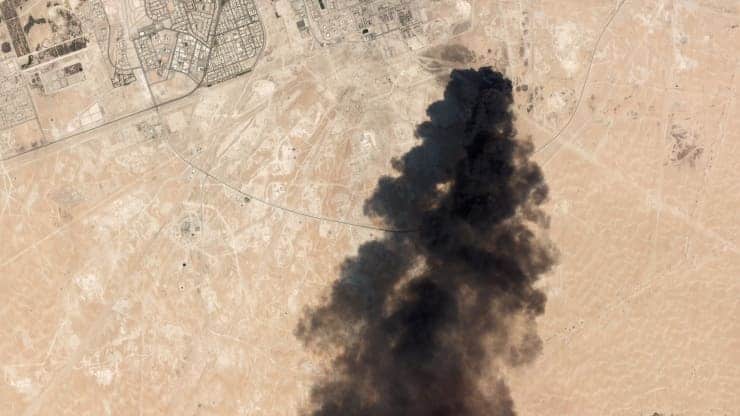
Saudi Arabia’s stock market fell by 2.3% at Sunday’s open as the country grappled with weekend drone attacks on the heart of its oil production facilities in Abqaiq and Khurais claimed by Yemen’s Houthi rebels.
Reports that the country may take weeks to return to full oil supply capacity is set to send crude futures up by as much as $10 per barrel, analysts say, depending on the scale of the damage. Half the country’s oil production was halted due to fire damage but is due to restart on Monday, Saudi energy ministry officials said in a statement.
“A small $2-$3 premium would emerge if the damage appears to be an issue that can be resolved quickly, and $10 if the damage to Aramco’s facilities is significant leasing to prolonged supply outages,” Ayham Kamel, practice head for the Middle East and North Africa at Eurasia group, said in a research note Sunday. That’s up to 25 cents higher per gallon of gasoline.
Abqaiq, in the kingdom’s eastern province, is the world’s largest oil processing facility and crude oil stabilization plant with a processing capacity of more than 7 million barrels per day (bpd). Khurais is the second largest oil field in the country with a capacity to pump around 1.5 million bpd.
Saturday’s attack is the biggest on Saudi oil infrastructure since Saddam Hussein’s invasion of Kuwait in 1990.
“Oil prices will surely spike on the news of the attacks when markets open on Sunday,” Joseph McMonigle, an energy analyst at Hedgeye Research and former chief of staff at the U.S. Department of Energy, wrote in a client note. “In our view, there is almost no geopolitical risk priced into oil markets that are focused solely on the macro and trade narratives.”
If the Saudis maintain closure of half its production, it would impact nearly 5 million barrels of crude production a day, roughly 5% of the world’s daily oil production. In August, Saudi Arabia produced 9.85 million bpd, according to the latest figures from the U.S. Energy Information Administration.
Saudi Aramco President and CEO Amin Nasser said no one was hurt in the attacks and emergency crews have contained the fires and brought the situation under control.
What Riyadh has called a terrorist attack on its state oil giant, Saudi Aramco, is also likely to unsettle future shareholders and market participants ahead of the company’s highly anticipated initial public offering (IPO).
“Very hard to overstate the seriousness of the attacks, especially on Abqaiq. It is the nerve center of the country’s energy infrastructure,” Helima Croft, global head of commodity strategy at RBC Capital Markets, told CNBC on Saturday. “Even if exports resume in the next 24 to 48 hours, the image of invulnerability has been erased.”
While Yemen’s Houthi rebels, who have been at war with the Saudis since 2015, claimed the attack, numerous officials and analysts point to Tehran. U.S. Secretary of State Mike Pompeo via Twitter blamed Iran for the attack, saying “Iran has now launched an unprecedented attack on the world’s energy supply. There is no evidence the attacks came from Yemen.”
Iran responded by calling the allegations “pointless.”
Security experts say the attack likely came from an Iranian-backed militant group in Iraq. Baghdad on Sunday afternoon denied its territory was involved in any way.
The Houthis have been behind numerous attacks on Saudi infrastructure in recent years, but they were not viewed as serious by the market, McMonigle said. This time, the attacks — regardless of their source — are impossible to ignore.

